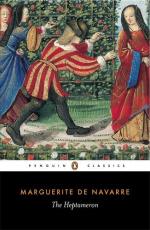“Vengeance, madam, is sweet when in place of slaying an enemy it gives life to a true lover.(6) Methinks it is time that truth should cause you to abandon the foolish love you bear to one who loves you not, and that a just and reasonable love should banish fear, which cannot dwell in a noble and virtuous heart. Come, madam, let us set aside the greatness of your station and consider that, of all men and women in the world, we are the most deceived, betrayed, and bemocked by those whom we have most truly loved. Let us avenge ourselves, madam, not so much to requite them in the way they deserve as to satisfy that love which, for my own part, I cannot continue to endure and live. And I think that, unless your heart be harder than flint or diamond, you cannot but feel some spark from the fires which only increase the more I seek to conceal them. If pity for me, who am dying of love for you, does not move you to love me, at least pity for yourself should do so. You are so perfect that you deserve to win the heart of every honourable man in the world, yet you are contemned and forsaken by him for whose sake you have scorned all others.”
6 The above sentence
being omitted in the MS. followed in
this edition, it has
been supplied from MS. No. 1520 in the
Bibliotheque Nationale.—L.
On hearing these words the Queen was so greatly moved that, for fear of showing in her countenance the trouble of her mind, she took the gentleman’s arm and went forth into a garden that was close to her apartment. There she walked to and fro for a long time without being able to say a word to him. The gentleman saw that she was half won, and when they were at the end of the path, where none could see them, he made a very full declaration of the love which he had so long hidden from her. They found that they were of one mind in the matter, and enacted (7) the vengeance which they were no longer able to forego. Moreover, they there agreed that whenever the husband went into the country, and the King left the castle to visit the wife in the town, the gentleman should always return and come to the castle to see the Queen. Thus, the deceivers being themselves deceived, all four would share in the pleasures that two of them had thought to keep to themselves.
7 This expression has allusion to the mysteries or religious plays so frequently performed in the fifteenth and sixteenth centuries. The Mystery of Vengeance, which depicted the misfortunes which fell upon those who had taken part in the crucifixion of Jesus Christ, such as Pontius Pilate, &c, and ended by the capture and destruction of Jerusalem, properly came after the Mysteries of the Passion and the Resurrection.—L.
When the agreement had been made, the Queen returned to her apartment and the gentleman to his house, both being so well pleased that they had forgotten all their former troubles. The jealousy they had previously




